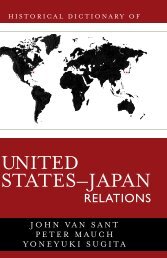Private Academies of Chinese Learning in Meiji Japan: The Decline ...
Private Academies of Chinese Learning in Meiji Japan: The Decline ...
Private Academies of Chinese Learning in Meiji Japan: The Decline ...
Create successful ePaper yourself
Turn your PDF publications into a flip-book with our unique Google optimized e-Paper software.
120 PRIVATE ACADEMIES OF CHINESE LEARNING IN MEIJI JAPANcastle town <strong>of</strong> Kumamoto, then <strong>in</strong> Edo under Shionoya Tō<strong>in</strong>. 7After his return, he followed <strong>in</strong> his father’s footsteps and taughtat the Jishūkan doma<strong>in</strong> school. Dur<strong>in</strong>g the last years <strong>of</strong> theShogunate and around the time <strong>of</strong> the Restoration he travelled toEdo and Kyoto <strong>in</strong> the service <strong>of</strong> his lord. When the doma<strong>in</strong>school was closed <strong>in</strong> 1870, he retired from public life and devotedhimself to his studies. He started teach<strong>in</strong>g <strong>in</strong> his own home, andwhen student numbers <strong>in</strong>creased he rented an additionalbuild<strong>in</strong>g. But dur<strong>in</strong>g the war <strong>of</strong> 1877 both burnt down and hemoved to Ikura <strong>in</strong> Tamana district (now Tamana city). When heopened Ronseidō there, he had only two students, but the numbersoon <strong>in</strong>creased to over 70. Most <strong>of</strong> them came from nearby, butsome came from Saga and Kurume. 8Other well-respected masters came from more humblebackgrounds. Uchimura Rokō (1821–1901) from Matsue was thethird son <strong>of</strong> an oil merchant and dur<strong>in</strong>g his teenage years hestudied by night aga<strong>in</strong>st the will <strong>of</strong> his parents while help<strong>in</strong>gwith the bus<strong>in</strong>ess dur<strong>in</strong>g the day. 9 After his father’s death hestudied <strong>in</strong> Osaka, and <strong>in</strong> 1851 he even entered the Shōheikō <strong>in</strong> Edo,although commoners were not normally admitted. In 1864 hewas employed by the school <strong>of</strong> his doma<strong>in</strong>. He opened his juku,Sōchōsha, <strong>in</strong> 1874, after the doma<strong>in</strong> school had been abolished,and also taught at new public schools dur<strong>in</strong>g the follow<strong>in</strong>g years.Fujisawa Tōgai (1794–1864) came from a family <strong>of</strong> farmers <strong>in</strong>Takamatsu doma<strong>in</strong> (now Kagawa prefecture), but was allowed tostudy <strong>in</strong> Osaka by his feudal lord. 10 He became a disciple <strong>of</strong>Nakayama Jōsan, a scholar <strong>in</strong> the tradition <strong>of</strong> Ogyū Sorai (1666–1728). From the age <strong>of</strong> 25 he studied <strong>in</strong> Nagasaki for three years.He settled <strong>in</strong> Osaka <strong>in</strong> 1824 and began to teach there. <strong>The</strong>follow<strong>in</strong>g year he established Hakuen sho<strong>in</strong> <strong>in</strong> Awajichō. Tōgaialso lectured at the Gansuidō (<strong>in</strong> Hiranogōchō, Osaka) and becamea reta<strong>in</strong>er <strong>of</strong> Takamatsu doma<strong>in</strong>, while cont<strong>in</strong>u<strong>in</strong>g to live <strong>in</strong> Osaka.His son Nangaku (1842–1920) <strong>in</strong>herited his father’s position andduties. 11 After the Restoration he took part <strong>in</strong> doma<strong>in</strong> reformsand was supervisor (tokugaku) <strong>of</strong> the doma<strong>in</strong> school. In 1872 hereopened Hakuen sho<strong>in</strong> and from then on devoted himself toprivate teach<strong>in</strong>g and scholarship. 12Even when a scholar came from a samurai family, it was <strong>of</strong>tenfrom the lower ranks <strong>of</strong> samurai. Yasui Sokken’s family was sopoor that they had to work as farmers despite their samuraiorig<strong>in</strong>s. Shigeno Yasutsugu’s family had only received the status<strong>of</strong> a country samurai (gōshi) <strong>in</strong> his father’s generation. Yamada













